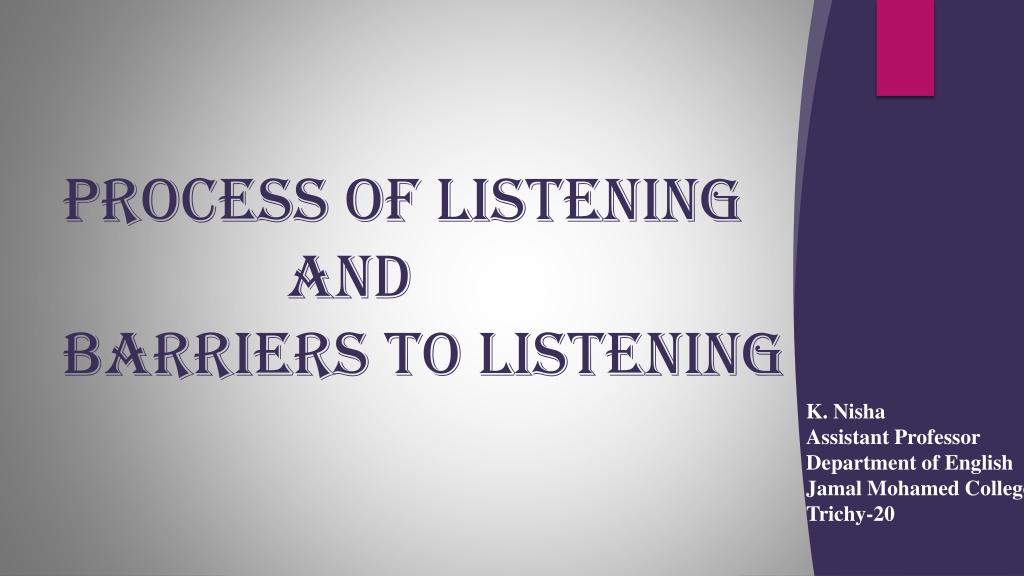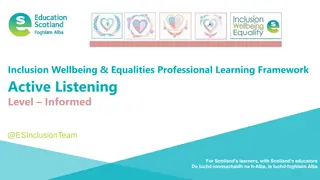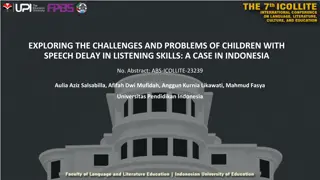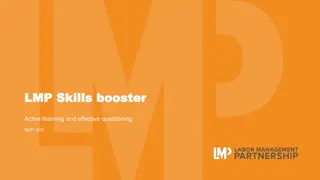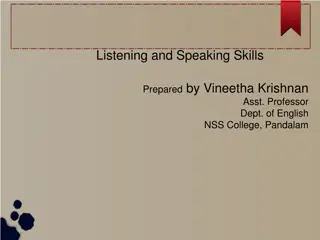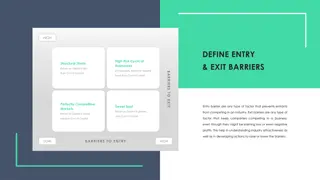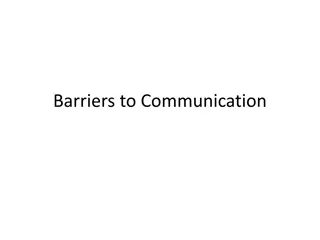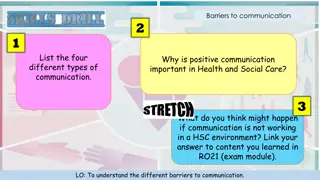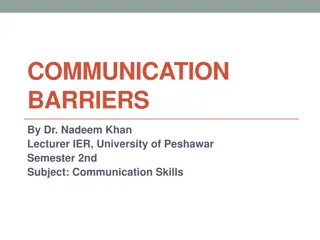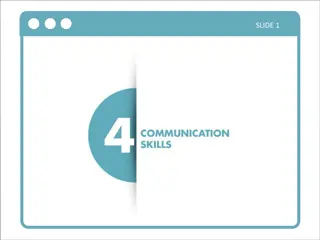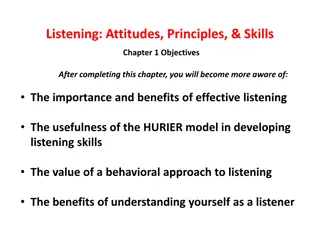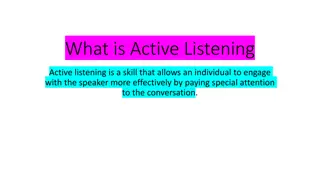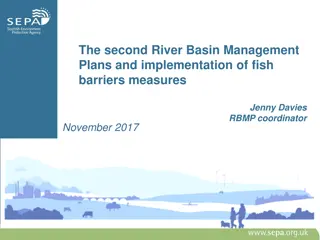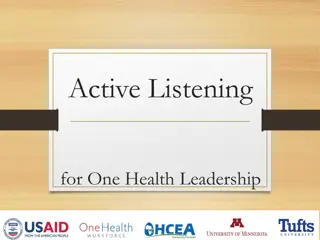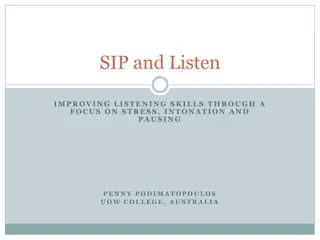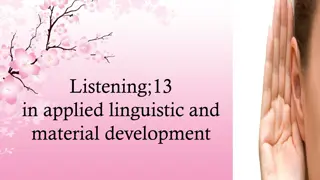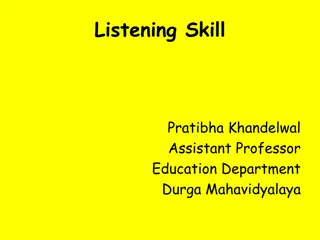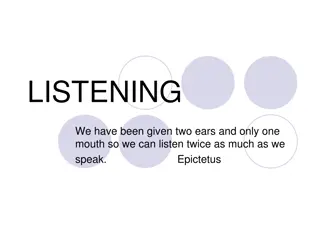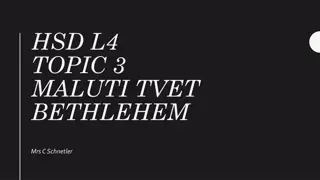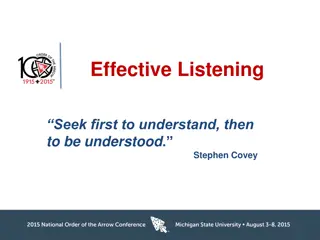Understanding the Process of Listening and Overcoming Barriers
The process of listening involves stages like receiving, understanding, interpreting, evaluating, and responding. Ways to enhance listening skills include being attentive, keeping an open mind, and providing regular feedback. Barriers to listening, such as distractions, can hinder effective communication and must be overcome for better understanding.
Download Presentation

Please find below an Image/Link to download the presentation.
The content on the website is provided AS IS for your information and personal use only. It may not be sold, licensed, or shared on other websites without obtaining consent from the author. Download presentation by click this link. If you encounter any issues during the download, it is possible that the publisher has removed the file from their server.
E N D
Presentation Transcript
Process of listening And Barriers to listening K. Nisha Assistant Professor Department of English Jamal Mohamed College Trichy-20
STAGES IN THE PROCESS OF LISTENING WAYS TO ENHANCE LISTENING SKILLS CONTROLLING DISTRACTIONS BARRIERS OF LISTENING OVERCOME THE BARRIERS OF LISTENING
STAGES IN THE PROCESS OF LISTENING Receiving Responding Understanding Evaluating Interpreting
Receiving When you have ears you can receive anything within the hearing range. So hear receiving means hearing It refers to the response caused by sound waves stimulating the sensory receptors of the ear UNDERSTANDING It is a stage at which you learn what tIt is a stage at which you learn what the speaker means he speaker means You will understand what you have heard the thoughts, the emotional tones, the feeling behind the words as well
INTERPRETING As our intension is selective so it is our memories what is remember may be things are different from what was originally heard or listen EVALUATING Consists of judging the message in some way you may buy to evaluate the speaker's underlying emotions or motive. Offen this process goes on without much conscious awareness
RESPONDING This stage requires that receivers complaints the process through verbal and nonverbal feedback The speaker has no other way to determine of a message has been received
WAY TO ENHANCE LISTINING Be attentive but relaxed Keep an open mind Listening to the words and try to picture what the speaker is speaking Don t interrupt and don t impose your solution Wait for the speaker to pause to clasifing questions Ask questions only to ensure understanding Try to feel what the speaker is feeling Given the speaker regular feedback
Controlling Distraction Distraction Listener's attentions to any personal inconveniences or to trivial happenings around are the potential enemies to his intensive listening. G.A. Lord says there are 3 kinds of distraction PHYSICAL DISTRACTION Things that interrupt our concentration by their presence Such things are Noice ,Speakers habits, Hand movements PERSONAL DISTRACTION Include toothache indigestion, and sleepiness being too hot or too cold Body odor , cramp, hunger
3. Physiological Distraction Somewhat subtler Our mind often colander as a direct result of what is being said Because the speaker uses a word or words which trigger off reactions in the listeners mind
BARRIERS TO LISTENING PHYSICAL BARRIERS Physical barrier consists of any sound that prevent a person from being heard Eg: WHISPERS , CHEERS , PASSING CAR PHYSIOLOGICAL BARRIERS When listener suffers from ill health issue , sleeplessness , hearing problems and it may also arise due to pronunciation short coming of period
OVERLOAD OF MESSAGE Its is difficult for the brain to digest the overloaded message.when the message in sequencing,it becomes more painful to concentration EGO Thinking that my own ideas are more important than those of other person or I AM RIGHT and OTHER IS WRONG is the major stumbling block in the way of listening
RULES OF GOOD LISTENING Stop talking Stop thinking Remove distractions Don t pre judge Be patient Empathize with the speaker Take notes
Overcome the barriers of listening Pay more attention to language Focus on the issue , not the person Value yourself and your own experiences Be flexible towards others Use simple language to suit the level of audience Do active listening Avoid information overload Make eye contact with the speaker instead of looking around the room
